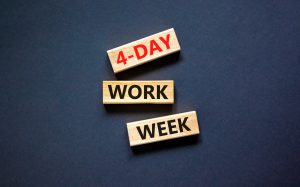Shall we try the short week?
An experiment has begun in England: as of last week, thousands of employees at 70 companies began working only four days a week as part of a pilot project to reduce workers’ hours for the same pay. The experiment will last six months and was organized by the nonprofit groups 4 Day Week Global and 4 Day Week Uk Campaign, an organization that studies the impact of work on personal well-being. Researchers from Cambridge, Oxford and Boston College universities will evaluate the effects of the short week on productivity and quality of life. They will analyze how employees respond to the idea of having an extra day off in terms of stress, work, overall satisfaction, health, sleep, energy consumption, and travel. The results, collected on the basis of staff interviews and surveys, will be announced in 2023 (
Nyt
).

Work better
In Britain, the experiment began when employees returned to work after a four-day vacation in honor of the 70th anniversary of Queen Elizabeth’s reign. Taking part in the experiment are now more than 3,300 workers employed in banking, marketing, health care, financial services, and retail. “
After the pandemic, people want a work-life balance
” – campaign director Joe Ryle said in an interview – “
they want to work less
” (
CBS News
). The project initiated in England, however, is not an isolated case. Other similar efforts are being made
in other countries
including Iceland, Ireland, New Zealand, Scotland and the United States, where companies are adopting more flexibility in working hours.
Scattered order
In the United States, some companies have allowed employees to reduce their work week by eliminating Fridays, working hybrid shifts, reducing wages and setting their own hours. In New Zealand, the company Unilever launched a trial of the shorter work week in 2020. Iceland is having a trial run with a 35-hour reduction in weekly working hours, involving about 2,500 civil servants. Companies in Ireland and Australia will begin trials on August 1, and two more trials will begin in the United States and Canada in October. Some experiments are already a success, such as the one done by Microsoft in Japan, where the company let it be known that it has experienced a 40 percent increase in productivity (
Npr
).










0 Comments